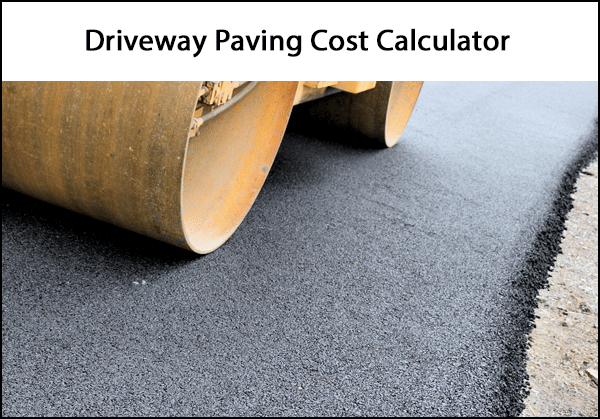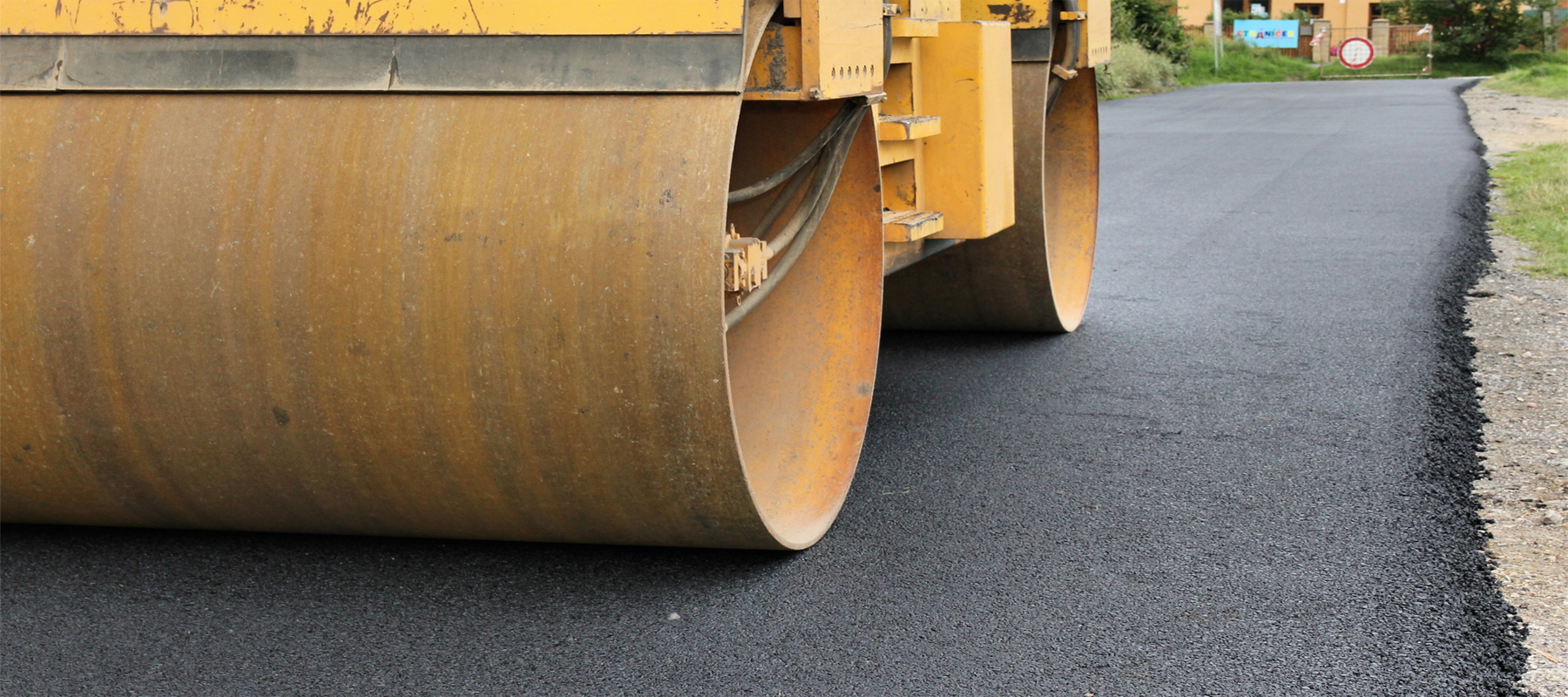Asphalt Driveway Paving Prices: Average Costs and Considerations
Last Updated: June 01, 2023

Fact Checked By: Ryan Maguire
On This Page
Summary: Asphalt Driveway Paving Prices #
The average cost of asphalt driveway paving is between $3 and $5 per square foot. The total cost to install an asphalt driveway is estimated between $3,000 and $10,000. If an exising driveway needs to be removed, the price will be on the higher end of that range.

- Total driveway paving cost will vary from region to region consistent with local material and labor costs.
- Most gravel driveways are made of crushed stone or gravel which costs about $25-$30 per ton plus $100 or so for delivery per load (the average dump truck can handle 13 or so tons.) For a small, 15 ft. x 20 ft. by 3 inch deep driveway, 5 tons should be more than enough, at a total cost of around $250. For a larger driveway or thicker base, the cost will be higher. For example, a driveway 15 feet wide by 700 feet long with a six inch base will need approximately 25 tons of gravel, at a material cost of about $700. With delivery, the total cost will be around $1000.
- The cost of pouring a concrete driveway depends on the quality of the concrete. For basic, construction-grade concrete the cost will be somewhere around $5-$10 per square foot. Stamped concrete can cost as little as $8 per square foot for colored concrete and $15+ for an elaborate design.
- A concrete driveway 90 feet long and ten feet wide would be around $1800 for materials plus an additional $2000 or so for labor, for a total cost of nearly $4000.
- Asphalt driveway paving costs $2-$6 per square foot installed. For a 500 square foot (50 x 10) driveway this works out to an average cost of $2500. You can estimate the amount of asphalt needed for your installation with this calculator.
- A Macadam driveway, also known as tar and chip, consist of crushed stone or gravel sprayed with liquid asphalt. They cost around $2-$5 per square foot.
- Another option is a cobblestone driveway. At around $5 per piece and thousands needed per driveway, plus labor at around $40-$60 per square foot, this can get quite pricey.
- A brick driveway starts at around $1.50 per brick plus the cost of installation. For a longer driveway which may need as much as 20,000 bricks, the cost of materials alone could be $20-$30,000, plus $10-$30 per square foot for labor.
- Most professional contractors can install gravel, concrete or asphalt driveway in a day. Cobblestone and brick require considerably more work and could take a week or more to install depending on the size of the driveway.
- Durability estimates for different materials include 10-30 for asphalt, 30-50 for concrete, 6-10 for tar and chip, and lifetime for gravel, cobblestone and brick.
- Asphalt and concrete driveways need to be resealed regularly. For asphalt in areas with hot, cold and/or wet weather, this may need to be done every year. In moderate climates every three to ten years might be sufficient. Concrete averages about five years before it needs resealing. A cost estimate for driveway resealing is between twelve and eighteen cents per square foot. For a 1000 square foot driveway this costs a total of $120-$180.
- Removing an existing driveway costs $50-$60 per hour.
- Driveways with slopes, curves, or that are otherwise difficult to surface will cost more in labor.
- If roads are being re-paved in your area, it may be possible to purchase excess asphalt from the government or private company in charge of the job.
- Do it yourselfers can save considerable money on labor.
Shopping For Driveway Paving Services? #
- Be sure to get several estimates from contractors. Be aware that a low-ball price may be an indication of poor workmanship.
- Driveway Installation and Maintenance Tips is a comprehensive website that includes information and tips, an article base as well as free driveway estimates.
How Long Will a New Asphalt Driveway Last? #
A new driveway is a major investment, one you want to last as long as possible. This starts with choosing the right material. One of the most popular paving materials on the market is asphalt, commonly praised for its appearance, durability, and relatively low cost. While longevity is based on factors such as maintenance, materials, and proper insulation, an asphalt driveway that is properly cared for can last 12 to 35 years.
Quality Material Equals a Quality Asphalt Driveway #
As with just about any other product or purchase, your asphalt driveway will only be as good as the materials that go into it, so choose quality materials. It is recommended to stay away from third-party vendors or dealers that aren't involved in the production process. The upfront price tag may be attractive, but lower quality materials reduce the overall lifespan of the asphalt, resulting in higher costs over time.
The best thing to do is to find a local manufacturer that operates their own plant and consistently produces quality products. Read reviews, talk to professionals, and ask others how certain brands have worked for them to help form an idea of the best solution for you. Also remember that recycled materials are not necessarily the same as low-quality materials. Properly done, recycled materials can be reintroduced to hot mix asphalt (HMA) and provide the same strength as new asphalt at a lower cost.
Professionally Installed Asphalt Driveways #
Installation is a major component of the longevity of your asphalt driveway. Lower costs can tempt you to complete the installation on your own, but unless you have experience in working with asphalt, it is not recommended. The process is more challenging than it seems and what appears to be a small mistake could turn out to be a major problem that lowers the lifespan and raises the cost of your driveway.
Contact a professional contractor who has experience with asphalt to handle installation for you. A good contractor takes the time to consider your drainage needs, level and grade your driveway, and uses the right materials to lay down your base and sub-base before paving. Don't be afraid to speak to more than one contractor; if one is not meeting your needs or doing the job right, you can always find another who will.
Asphalt Driveway Proper Curing Time #
You can have the best materials in the world installed by an expert in asphalt paving, but that won't mean anything if you don't give your driveway enough time to properly cure. A short curing time leads to dents, scars, and other damage that affect the appearance and structural integrity of the driveway. It is recommended to wait between 48 and 72 hours after the asphalt has been poured before you drive, park, or walk on it.
Some people recommend waiting up to five days before using an asphalt driveway. It takes another 6 to 12 months before the asphalt hardens fully after the initial curing period. While the driveway is usable, avoid parking in the same spot or using car jacks or ramps (unless a wood block is placed underneath) to prevent possible issues.
Sealcoat Your Asphalt Driveway #
Severe weather conditions may damage asphalt. The biggest cause of deterioration is moisture, and heavy or frequent rain and snow leave a massive impact. But a proper sealcoat protects your driveway and ensures that it lasts for years to come.
Your instinct may be to seal your driveway as soon as it's installed, but sealing it too soon actually does more harm than good. Wait until the full 6 to 12 month asphalt curation period has ended before sealing your driveway. You also need to reapply the sealant every two to three years to make sure it holds strong.
Watch for Weeds #
Grass, weeds, and the roots of larger plants may to push their way through the asphalt. For the most part, you can take care of pesky vegetation with a spot killer. But larger plants or trees near the driveway will most likely need to be removed to avoid long-term issues. If you do have a tree near the driveway but do not wish to remove it, the only solution when roots push through is to fill the cracks every year.
Resources:
